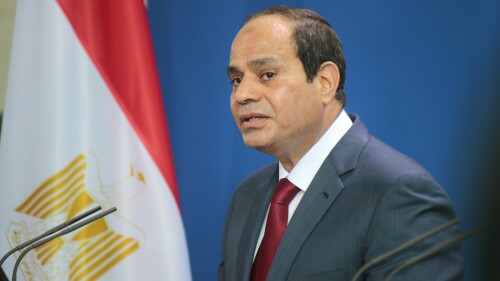U.S. Ambassador to Israel Thomas Nides defended American financial support for the United Nations Relief and Works Agency for Palestine Refugees (UNRWA) in a March 22 webinar. |
In a recent webinar for Americans for Peace Now (APN), the new U.S. ambassador to Israel, Thomas Nides, discussed his vision for the Middle East. Among the topics he addressed was the United Nations Relief and Works Agency for Palestine Refugees, better known as UNRWA. He declared that he didn’t believe giving money to UNRWA hurts the security of Israel.
Nides’ statement reflects his longstanding agenda. Back in 2012, it was Nides who sent a letter to the US Senate’s Committee on Appropriations, arguing against legislation that sought to distinguish between Arab Palestinians displaced in 1948 and their descendants, who are also considered refugees. This critical distinction would reduce the number of registered refugees from the impossible number of 5 million to just 30,000. Nides wrote that the legislation would undermine American ability to act as a peace mediator, “and generate very strong negative reaction from the Palestinians and our allies in the region, particularly Jordan.”
In one sense, Nides was correct: telling the truth about Arab Palestinian refugees has consequences. In May 2021, when Israel fought its last war with Hamas in Gaza, UNRWA’s then-director of operations the Gaza Strip, Matthias Schmale, became persona non grata and was forbidden from returning to Hamas-ruled Gaza. Schmale’s crime was telling Israel’s Channel 12 that Israeli attacks on Hamas installations were precise: “I’m not a military expert but I would not dispute that. I also have the impression that there is a huge sophistication in the way the Israeli military struck over the last 11 days.” Schmale also denied that there were shortages of food and medical supplies in Gaza.
Elizabeth Campbell, formerly UNRWA’s Washington lobbyist, now works for the Biden State Department. |
Despite saying that “So yes they did not hit, with some exceptions, civilian targets, but the viciousness and ferocity of the strikes was heavily felt,” Schmale’s remarks produced outrage among Palestinian factions, including Hamas, which stated his “comments are a complete distortion in favor of the Zionists including an attempt to exonerate the Occupation of the murder of 254 Palestinians, more than 40% of them children, women and the elderly.” Other Palestinian factions quickly argued that Schmale was “a major reason for the suffering of thousands of Palestinian refugees and UNRWA employees in the Gaza Strip.”
Even the Obama administration acknowledged that the 2014 Gaza War generated bad publicity for UNRWA. American legislators demanded investigations into how Hamas weapons found their way into UNRWA schools. For the State Department, the matter is pressing, particularly given that Section 301(c) of the Foreign Assistance Act of 1961 (amended) states that:
No contributions by the United States shall be made to [UNRWA] except on the condition that [UNRWA] take all possible measures to assure that no part of the United States contribution shall be used to furnish assistance to any refugee who is receiving military training as a member of the so-called Palestine Liberation Army or any other guerilla-type organization or who has engaged in any act of terrorism.
Washington supports UNRWA because it doesn’t want the Palestinian issue to threaten other policy imperatives.
Washington has supported UNRWA for decades largely because it does not wish the Palestinian issue to threaten other policy imperatives. During the Cold War, these were defined as containing communism through various security arrangements and maintaining the flow of energy resources from Arab, oil-producing states. American diplomatic efforts toward establishing a Palestinian state began in the post-Cold War context of unchallenged American power and rising regional hegemons. But energies were directed through the Oslo process and the Palestine Liberation Organization, which led to the creation of the Palestinian Authority, an entity that has deliberately failed to create stable foundations for a functioning state.
Nides, Campbell, and others are representative of the Biden administration’s animus towards Israel. Biden is following the Obama administration’s playbook of “tough love” vis-à-vis Israel, rushing to embrace Iran and a perilous nuclear deal that has terrified Arabs and Israelis alike. Support for Palestinian causes like UNRWA, as well as Nides’ hysteria about Israeli construction in the West Bank, are sops thrown to the shrinking number of ideologues who think the world revolves around Palestine.
U.S. taxpayer money would be better spent promoting independent civil organizations and private-sector growth.
But the one place where Palestine does increasingly matter is in American politics, where the issue has been taken up by the progressive wing of the Democratic Party. It is unclear how promoting the Palestinian ideology—that claims they are entitled to return to places once occupied by parents, grandparents, and great-grandparents which are now in Israel, and in the process transform Israel into a Jewish minority state—serves U.S. policy, much less the cause of peace. Pouring more money into UNRWA is bad all around as it is an unaccountable black hole. Ultimately, Americans’ tax money would be better spent promoting independent civil organizations and private-sector growth.
Asaf Romirowsky is a fellow at the Middle East Forum, executive director of Scholars for Peace in the Middle East, and a senior non-resident fellow at the Begin-Sadat Center for Strategic Studies (BESA).









